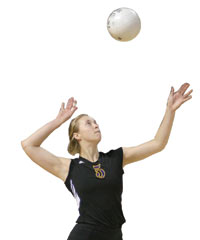NCAA News Archive - 2006
« back to 2006 | Back to NCAA News Archive Index
Student-athlete’s part-time job leads to discovery of her life’s work
|
The NCAA News
When
What the Golden Eagles senior outside hitter found was a calling.
Between her freshman and sophomore seasons, Morrow was placed with
Before taking the job, Morrow had little experience with children beyond babysitting, let alone experience with and knowledge of how to handle children with special needs. In fact, she had never worked in a camp setting.
“I went in not knowing what to expect,” said Morrow. “The different degrees of abilities we had was really shocking. We had some kids who were completely immobile and others who would run all over. You’d have some kids who were very high functioning and others with whom it was tough to interact. Some kids were nonverbal and used sign language or made up their own sign language.”
If Morrow went in blind, her eyes were opened on the first day of her
“It became a learning experience for both of us that summer — me trying to figure out how to communicate with her and her trying to let me know what she meant,” said Morrow. “It took me aback that she was capable of doing that. I didn’t know how high functioning she was. It showed
me that just because people have disabilities as severe as autism, they are still extremely intelligent people. They just have this wall inside them they can’t get through. It was remarkable to me.”
Morrow describes
Since that first day of that first summer, Morrow has found her rhythm. She has returned to work at
“The biggest factor is seeing a segment of the population that sometimes gets neglected,” she said. “The fact that we get out into the community gives the kids an opportunity to do things all other kids get to do, and the community gets to see that these kids are just like other kids who want to go and play and get attention.”
After earning a bachelor’s degree in biology in May, Morrow will pursue a doctorate in physical therapy at the
© 2010 The National Collegiate Athletic Association
Terms and Conditions | Privacy Policy

